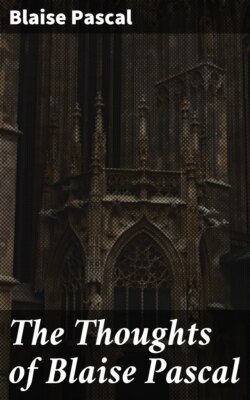Читать книгу The Thoughts of Blaise Pascal - Blaise Pascal - Страница 7
На сайте Литреса книга снята с продажи.
NOTES FOR THE GENERAL INTRODUCTION.
ОглавлениеTable of Contents
To doubt is then a misfortune, but to seek when in doubt is an indispensable duty. So he who doubts and seeks not is at once unfortunate and unfair. If at the same time he is gay and presumptuous, I have no terms in which to describe a creature so extravagant.
A fine subject of rejoicing and boasting, with the head uplifted in such a fashion. … Therefore let us rejoice; I see not the conclusion, since it is uncertain, and we shall then see what will become of us.
Is it courage in a dying man that he dare, in his weakness and agony, face an almighty and eternal God?
Were I in that state I should be glad if any one would pity my folly, and would have the goodness to deliver me in despite of myself!
Yet it is certain that man has so fallen from nature that there is in his heart a seed of joy in that very fact.
A man in a dungeon, who knows not whether his doom is fixed, who has but one hour to learn it, and this hour enough, should he know that it is fixed, to obtain its repeal, would act against nature did he employ that hour, not in learning his sentence, but in playing piquet.
So it is against nature that man, etc. It is to weight the hand of God.
Thus not the zeal alone of those who seek him proves God, but the blindness of those who seek him not.
We run carelessly to the precipice after having veiled our eyes to hinder us from seeing it.
Between us and hell or heaven, there is nought but life, the frailest thing in all the world.
If it be a supernatural blindness to live without seeking to know what we are, it is a terrible blindness to live ill while believing in God.
The sensibility of man to trifles, and his insensibility to great things, is the mark of a strange inversion.
This shows that there is nothing to say to them, not that we despise them, but because they have no common sense: God must touch them.
We must pity both parties, but for the one we must feel the pity born of tenderness, and for the other the pity born of contempt.
We must indeed be of that religion which man despises that we may not despise men.
People of that kind are academicians and scholars, and that is the worst kind of men that I know.
I do not gather that by system, but by the way in which the heart of man is made.
To reproach Miton, that he is not troubled when God will reproach him.
Is this a thing to say with joy? It is a thing we ought then to say with sadness.
Nothing is so important as this, yet we neglect this only.
This is all that a man could do were he assured of the falsehood of that news, and even then he ought not to be joyful, but downcast.
… Suppose an heir finds the title-deeds of his house. Will he say, "Perhaps they are forgeries?" and neglect to examine them?
We must not say that this is a mark of reason.
To be so insensible as to despise interesting things, and to become insensible to the point which most interests us.
What then shall we conclude of all these obscurities, if not our own unworthiness?
